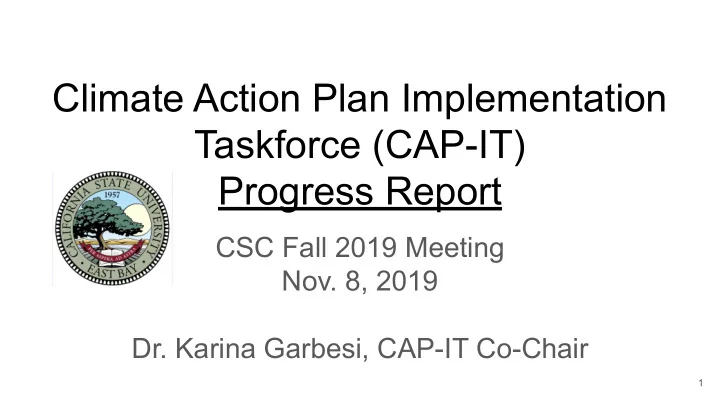

Climate Action Plan Implementation Taskforce (CAP-IT) Progress Report CSC Fall 2019 Meeting Nov. 8, 2019 Dr. Karina Garbesi, CAP-IT Co-Chair 1
Climate Action URGENCY: Need to Avoid the Tipping Point Tipping Point starts at 1.5C warming after which feedback effects catalyze a runaway warming beyond our control Result: Mass extinction, massive destruction of Earth’s life support systems, enormous human suffering ● (IPCC October 6, 2018) ● IPCC Special Report Summary for Teachers 2
URGENT ACTION IS NEEDED!!! Must achieve Zero Net emissions globally by as early as 2040! CSUEB target is currently 2040 UN Secretary General: “We face a direct existential threat … If we do not change course by 2020, we risk missing the point where we can avoid runaway climate change, with disastrous consequences for people and all the natural systems that sustain us.” 3 (IPCC October 6, 2018)
Overview ● Climate Action Taskforce developed our Climate Action Plan (CAP), which was: ○ Endorsed by the Senate Ad Hoc Sustainability Committee ○ Endorsed by the Campus Sustainability Committee ○ Approved by the President, April 2018 ● The Implementation Taskforce (CAP-IT) began work Fall 2018: ○ Established a CAP implementation framework ○ Identified barriers to, and opportunities for, progress ○ Identified priorities for action ; 4
Priorities for Action: Transportation and Campus Energy DOMINANT SOURCES Transportation, including ● Commuting ● International Student Travel ● Directly-financed travel ● Campus fleet Campus energy, including ● Electricity ● Heating (stationary) 5
BUT NO EMISSIONS REDUCTIONS YET! We must reduce campus emissions by 5% per year at minimum just to keep up! (and THAT assumes we started in AY17-18) 6
Concerns: Recent Actions Directly Contradict the CAP ● Solar IV MEA opportunity from Chancellor’s Office opened AY17-18; ○ No RFP issued by CSUEB to date (will we lose the opportunity?) ● Solar on the PE Building; ○ Largest PV system on campus being removed; no plans to replace ● Solar on the Core Building: Under CAP must be zero-net-energy; ○ plans now only for “solar-ready”, but no actual solar on the building ● EV Charging is to be incentivized under the CAP; ○ As of Nov 1, not more free charging. Now pay well above market rates to charge: Decision made without consultation with Senate or ASI. ● Alternative transportation goal under the CAP: “Pursue subsidized transit passes for students, staff, and faculty” ○ AC transit had reached agreement with transportation for AC transit passes for all faculty, staff, and students and potential for zero emission buses. Not pursued against recommendations. Stakeholders not consulted. 7
Barriers & Solutions to Campus Emissions Reductions Based on CAP-IT AY18-19 work (create infrastructure for implementation) BARRIERS ● Bandwidth (inadequate staffing) ● Funding (CAP = unfunded mandate) SOLUTIONS ● $0.5M per year from Solar IV (6.5MW PV system) ● Green Revolving Fund ○ Savings from CAP projects used only to support future CAP projects ● $2M per year from Parking (subsidize alternative transportation) ○ Per CAHS Emergency Resolution 8
BACKGROUND: Cost Savings Achievable with Solar IV Assume: • Use CO’s cost estimate for ground mounted solar (7c/kWh) • We install 6.5 MW of ground-mounted systems • Displacing electricity we currently buy for $0.13/kWh (4c/kWh for direct access energy and 9c/kWh for transmission distribution) • Savings = 6c/kWh • Annual Cost Savings: Over $8.2M over 15-year system lifetime
Proposal for Vote of the CSC That the CSUEB Administration Commit to Actively Supporting Implementation of the CAP, specifically: 1. Issue RFP for Solar IV (Max size project) by end of Fall 2019 2. Create Green Revolving Fund, with all savings from CAP projects protected in the fund, solely for CAP use 3. Support for alternative transportation 4. Consult the CSC and stakeholders (faculty, staff, and students) on issues affecting CAP implementation 5. Be transparent regarding all decisions affecting GHG emissions 6. Be accountable through annual reporting on plans and progress 10
Recommend
More recommend